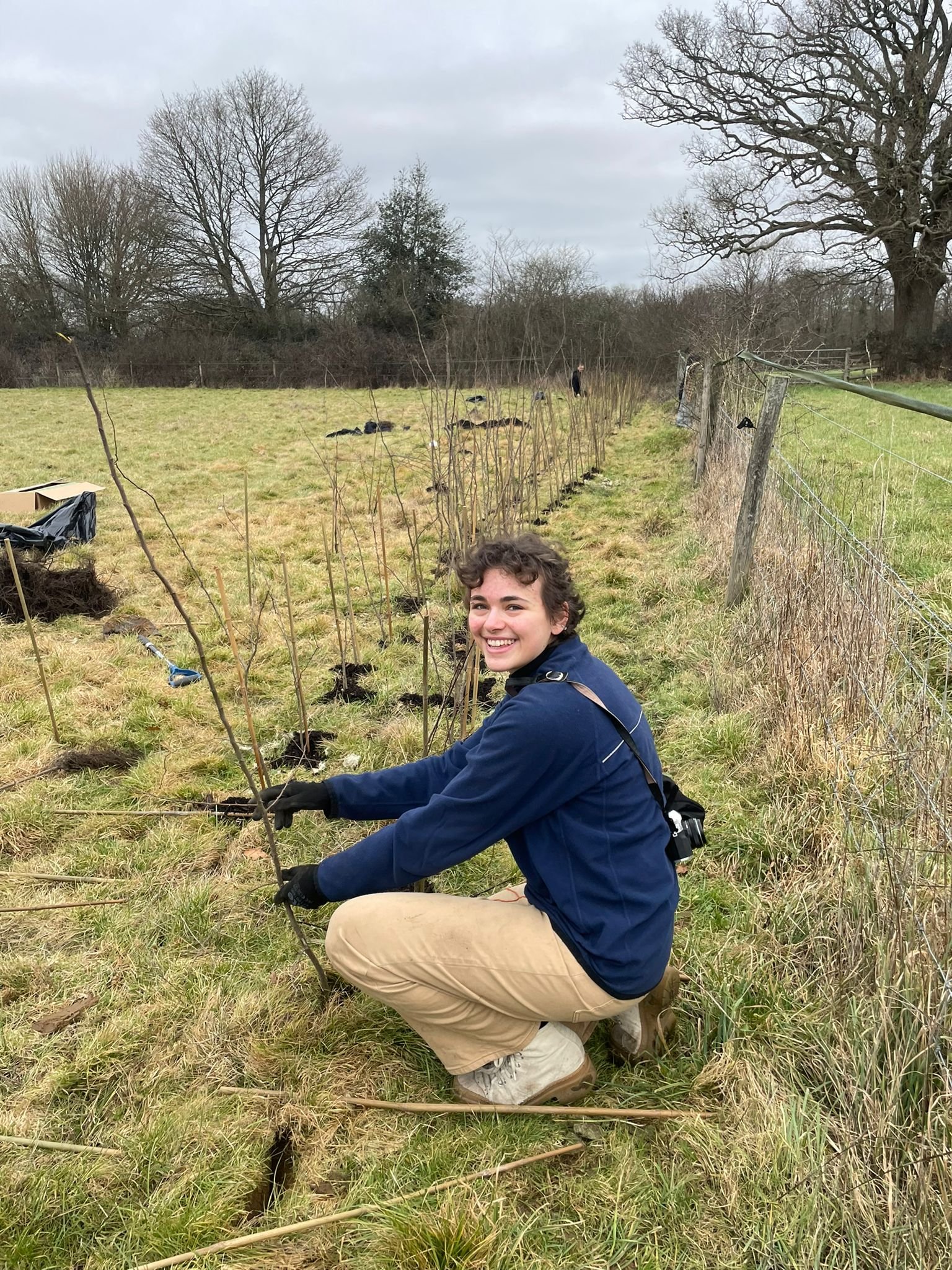Maple Farm 2023 - Year in Review
As we launch into a new year at Maple Farm, we take a moment to reflect on the year that was. And the year that was was iconic, to be honest with you. There’s been hogweed combat, butterfly hoards so dense they block out the sun, camera trap sleuthing, habitat building and more volunteer days than you can shake a stick at. However, as in the game of life itself, there can only be one winner. So in the spirit of hierarchy and victory, the Youngwilders team gathered to choose our favourite moments of Maple Farm’s 2023, season by season. Below are the results!
Winter - Hedgeruary
Between 1950 and 2007, the total length of hedgerow in the UK decreased from around 1,000,000 km to 477,000 km. A decrease of 52%, meaning a length equivalent to circling the world 13 times was destroyed. This has removed vast swathes of the links that were holding our fractured ecology together and has played a key role in decimating wildlife populations across the country.
With intent to play our part in addressing this historic wrong, February 2023 bore witness to ‘Hedgeruary’, three consecutive hedge planting days across three Saturdays in February.
The first day chapter of Hedgeruary, called ‘Hedgeruary Chapter 1: Hedgeruary Begins’, was held on the north side of the Maple Farm Rewilding Project. The north side has been grazed especially intensively so no natural regeneration has been possible in recent years. This has led to species-poor grassy monoculture. The biodiversity dearth in this part of the site is especially worrisome as it disconnects the ecological successes in the southern part of the site with an old hedgerow network branching from the north of the site.
With this in mind we planted 700 native tree species in an 80-metre hedgerow, connecting the northern edge of the project to the flourishing core. Massive thank you to the 15 young volunteers who gave up their Saturday to help us plant, we appreciate you!
The survival rate for this hedgerow has been our highest ever, 95+%, and the speed of growth has been remarkable. We’re excited to see how it matures and will be posting about it in the years to come.
Spring - Outdoor Classroom
The Outdoor Classroom was our most complex operation to date. The plan was to take apart some disused horse sheds for material, then, supplemented with some locally sourced building waste, create a beautiful classroom that we could centre our nature education ambitions around.
Co-lead by design group Flimsy Studio, it was built by a phenomenal team of 33 young volunteers across two long weekends in May.
Since its creation it’s hosted and number of volunteer days, a field skills class and is the soon-to-be haunt of a local forest school. The classroom programme in 2024 is rammed with new field skills seminars and discussion groups, with more experimental uses including an audio exhibition and applied theatre workshops under discussion
It’s been a game-changing asset for us and we’re grateful to everyone who helped us make it a reality.
Summer - Technical Workshop
Summer saw Maple Farm host Youngwilders’ first technical workshop. We had been planning to do such workshops for some time, with the idea being we’d use our technical ecological work as an educational tool for young people hoping to get involved in the nature recovery sector professionally. Our wetland experimentation day in August served as a thrilling proof of concept.
We spent the day testing the floodplain’s ability to hold water, the results of which would decide whether our proposed wetland scrapes would be able to hold enough water for enough time to be ecologically beneficial. We invited a core group of young volunteers to be involved in the workshop and learn more about the wetland creation. Aside from the educational aspect of the work, the results demonstrated that the soil drained too quickly for making scrapes to be worth the resource investment, a very helpful and cost-saving piece of information!
Autumn - Free the landscape
Over Halloween weekend we had our spooky defencing volunteer day that we called ‘Free the Landscape II: Spooky Edition’. 15 young volunteers dressed in spooky and spooky adjascent clothing took down around 1km of unused fencing and used the fence posts to make a log-pile habitat. We’ve since set up a camera trap and have been recording the critters who’ve moved in. Lots of field mice so far!
Taking down needless fences is a vital part of conservation and rewilding work globally. Fences disrupt the natural movement of animals through the landscape and can lead to habitat fragmentation and genetic isolation. Further, and more relevantly to our work at Maple Farm, they can needlessly injure or kill the animals that get ensnared.
It’s great to have had such a productive defencing day, and we’re now in a position to have fully defenced Maple Farm by the end of 2024!
Thank you!
Those are the seasonal highlights, thanks so much to all the project supporters who have helped ensure Maple Farm has been the ecological and nature-engagement success story it has been. It’s been a pleasure to work on and we’re thrilled for an even more productive 2024.
Till next time!
Our queen Noemi hedge planting at Hedgeruary Chapter 1, February 2023
Outdoor Classroom, Volunteer build day, May 2023
Image of beautiful finished product! May 2023
Group of grinders doing some big-brain science at our first technical workshop. Maple Farm Project Officer Conor McNeil left, Youngwilders Director Jack Durant middle and Maple Farm Artist in Residence for 2024 Dee Sharma right! August 2023
A group of legend-level volunteers take down fencing at Free the Landscape II: Spooky Edition. October 2023
One we made earlier! Finished fence post log-pile and critter heaven. 2023 edition completed in November.
Volunteers hanging at the classroom, October 2023







